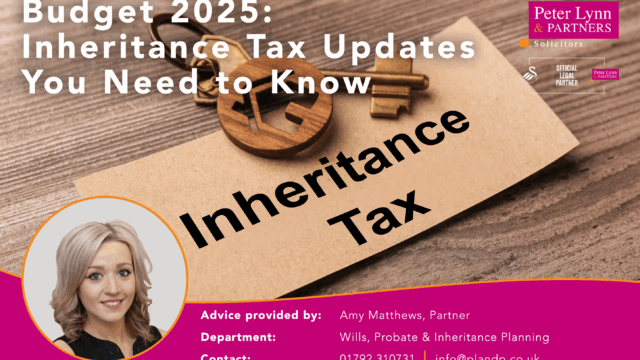The Budget – What does it mean for Estate Planning?

On 26 November 2025, Rachel Reeves, Chancellor of the Exchequer, delivered the 2025 Autumn Budget 2025. Amongst a variety of tax and wealth-asset measures were a number of announcements affecting Inheritance Tax – including freezes on thresholds, reforms to reliefs on business and agricultural property, and anti-avoidance rules designed to bring more wealth into the tax net.
Freeze to thresholds and allowances.
The Budget announcement included a decision to extend the freeze on the main IHT thresholds and allowances until at least 5 April 2031.
The Nil Rate Band – the value of an estate that can be passed on tax-free – remains at £325,000 per person.
The Residence Nil Rate Band – which allows additional tax-free allowance if a residence is passed to direct descendants – stays at £175,000.
The combined relief allowance for business and agricultural property remains fixed at £1 million.
As property values and wealth tend to rise over time (especially with inflation), the frozen threshold means that more and more estates will exceed the tax-free allowance and become liable for IHT. Even estates that might previously have avoided IHT may now pay, particularly with the autumn budget announcement that unspent pension pots will no longer be excluded from IHT as of April 2027.
Reforms for Business & Agriculture Property Relief
In addition to the freeze on the allowance above, the Budget built on the reforms announced in 2024. From 6 April 2026, APR and BPR will apply fully only to the first £1 million of qualifying assets; beyond that amount, relief will be limited.
However, importantly, it was announced that any unused portion of that £1 million allowance will now be transferable between spouses or civil partners, including if the first death occurs before 6 April 2026. That was not previously the case.
Whilst this is somewhat good news, the cap on relief at £1 million may still significantly limit the benefit for very large estates – such as large farms or long-standing family businesses – where the value exceeds that threshold.
Anti-avoidance and Trust changes
In addition to the above, the Budget introduced measures aimed at closing loopholes – especially for those with offshore trusts, foreign property, or pension pots.
Key changes:
- The definition of the charitable IHT exemption will be tightened as only direct gifts to registered UK charities or clubs are exempt. Gifts to non-UK organisations will no longer automatically qualify for the charitable exemption for IHT.
- A £5 million cap will be applied to “relevant property” trust charges for pre-existing excluded-property trusts (those set up before 30 October 2024). This aims to limit the use of trusts to shelter large estates from IHT.
- For individuals and trusts who are long-term UK residents, the government will treat UK agricultural property held via non-UK entities as UK-situated for IHT purposes. This removes a potential avoidance approach through offshore structuring.
These changes reflect a push by the government to tighten IHT rules and close what it views as loopholes, especially where wealth is held via trusts, offshore entities, or pension vehicles.
Considerations for you
Given these changes, some considerations for individuals and families should be had over the coming years:
- Pensions become part of the IHT-calculable estate from 6 April 2027 – so if you have large pension pots, you may wish to revisit estate planning.
Example:
You die with £300,000 in unspent pension savings
→ That £300,000 may now attract IHT at 40% (depending on other allowances).
This is one of the most significant new changes affecting middle-income families.
- As the thresholds remain frozen, inflation and asset-price increases – especially property – may push more estates over the tax threshold even without further changes; proactive planning may be prudent.
Nil Rate Band Example:
Your home is worth £450,000, with no mortgage. Even with minimal savings, your estate is likely over the threshold for a single person, especially if accounting for inflation.
→ You may face IHT if passing assets on to someone who does not qualify for a further exemption or relief.
- The new APR/BPR transferability takes effect from 6 April 2026. This gives some time to consider how to organise wills, joint ownership, and estate plans between spouses or civil partners.